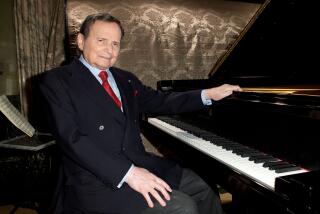Sviatoslav Richter; Leading Russian Pianist
- Share via
MOSCOW — Sviatoslav Richter, who rose to fame in the Soviet Union in the 1940s to become one of the 20th century’s leading pianists, died of a heart attack Friday in a Moscow hospital, the Russian Culture Ministry said. He was 82.
Renowned for improvisatory genius, Richter could sell out any concert hall in the world, even at age 80.
Although the music world had many pianists who were technically brilliant, Richter was one of the few who excelled both technically and artistically.
His was a wide repertoire that included practically all styles, from Bach to Debussy, Prokofiev and Shostakovich.
When Richter played a series of concerts at the Los Angeles County Music Center and the Pasadena Civic Auditorium in 1965, Times music editor Albert Goldberg said audiences were treated to “true Richter magic.”
“Pianistically the quality was unvarying,” the critic wrote. “He is one of the masters of the instrument.”
Two years ago, on Richter’s 80th birthday, Russian President Boris Yeltsin called his musical interpretations “a source of inspiration and love of beauty.”
Through the years, the world’s top music critics described his work as “impulsive,” “dangerously intense,” “graceful,” “enchanting” and “honest.”
“He can give the impression of living at the spur of the moment,” wrote one critic in 1995.
Despite his prodigious talent, Richter shunned the usual concert tour, and preferred to present performances without a program.
Aloof and eccentric at times, he insisted on playing in almost complete darkness at a London concert in 1993, showcasing his abilities by the light of a single piano lamp. This, Richter said, helped the audience concentrate on what was important: the music.
“We are living in an age of voyeurs,” Richter said, “and nothing is more fatal for music.”
Richter was born March 20, 1915, in Zhitomir, Ukraine. He learned music from his father, a pianist and organist, and began conducting at the Odessa Opera House while still a teenager. He gave his first solo piano performance in 1934, also in Odessa.
From 1937 to 1947, Richter studied at the Moscow Conservatory under well-known pianist Heinrich Neuhaus.
He became the Soviet Union’s leading pianist in the 1940s and toured the world in the 1950s. He rarely toured in his final years but was hardly forgotten.
When his recordings were released in 1993, Times critic Herbert Glass remarked that Richter’s “sight-reading can at times penetrate to the music’s core more readily than many another pianist’s years of study.”
In 1961, Richter was named a People’s Artist of the USSR, the highest Soviet honor for a performing artist.
“Richter was admired for his exceptional power of expression and inimitable individuality, exquisite performance skills and a breathtaking wealth of nuances,” said Igor Veksler of ITAR-Tass news agency.
Russian television newscasts on Friday aired tributes to Richter and showed clips of his performances, as did TV programs in the pianist’s adopted home country of France. With Richter’s death, “the piano loses one of its greatest virtuosos,” said French Prime Minister Lionel Jospin. “This evening, art is in mourning.”
Burial will be Monday in Moscow.
More to Read
The biggest entertainment stories
Get our big stories about Hollywood, film, television, music, arts, culture and more right in your inbox as soon as they publish.
You may occasionally receive promotional content from the Los Angeles Times.










